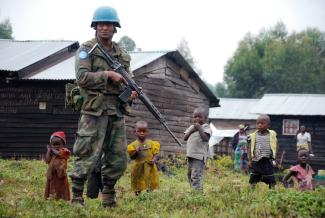Genocide
Protection from atrocities

The UN principle of R2P puts sovereign states in charge of their peoples’ well-being. If a country’s political leadership does not comply with R2P, the international community is allowed to intervene in order to prevent people from being harmed. Options range from economic sanctions to military intervention.
In a joint study, Germany’s Heinrich Böll Foundation and the Global Public Policy Institute have assessed what impact R2P has had on US foreign policy. Traditionally, Washington has been motivated by moral and humanitarian concerns, the study states, but the prevention of genocide and crimes against humanity has only recently become an explicit goal. Moreover, Washington does not necessarily act selflessly, but tends to pursue its own interests.
The authors praise Barack Obama for being the first president to prioritise R2P. The doctrin is part of his security strategy. In March, the USA even proposed to make the prevention of atrocities a main topic of its development-policy dialogue with the EU. In such contexts, the demand for German contributions will increase, the study concludes. The authors admit, however, that they cannot make out whether Obama’s policy differs from those of previous administrations in practical terms. Washington’s actions tend to be short-term and event-bound. Obama’s administration hardly tackles the complex underlying causes of crises. During the presidential elections in Kenya this spring, for instance, US diplomats spoke out in favour of non-violent implementation, but could not act on the complex domestic political tensions in the country.
In the Democratic Republic of the Congo, where violence has been flaring up again and again, the USA and other donor countries behave cautiously, as the study states. They do not feel up to the daunting challenge of enforcing peace in such a huge country.
The Syrian civil war looks similarly intractable. Last year, the Obama administration started to support the opposition there by civilian and diplomatic means as well as arms shipments to third parties. Some American politicians urge Obama to use armed force. His military commanders, however, see little chance of success when it comes to the establishment of a stable and peaceful state after an intervention. According to the scholars from Böll Stiftung and the Public Policy Institute, the Syrian example shows that the USA’s possibilities are limited. What impact the recent debate on chemical-weapon use in Syria would have remained to be seen when D+C/E+Z went to press.
UN peacekeeping missions, which deserve more support, are a core concern of the study. The experts call for a broad public debate on the conditions and consequences of R2P. Rich countries that do not participate in the debate for fear of appearing to be militaristic miss their chance to influence tangible operations. In an emergency, they must choose between joining in or merely supplying arms.
The experts are in favour of close interaction between academia, politics, development cooperation and the military in order to use valuable experience and identify new options for action. The authors emphasise that supranational organisations can only be as strong as their member governments make them (see article on the African Standby Force in this edition). Therefore R2P should be anchored in national policy.
Moreover, the authors want donor governments to intensify their debate with emerging markets as China, Brazil and India. The global world order is no longer only dominated by the values and interests of western actors, they argue, so new players must contribute to developing and executing the UN’s legal responsibilities.
Floreana Miesen







